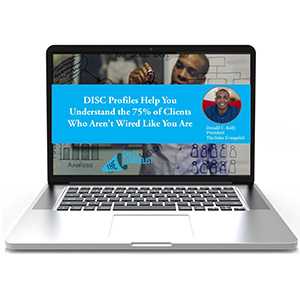 If all of your clients were exactly alike, sales would be a breeze. If each customer had the same needs and each operated with the same motivation, your job would be easy.
If all of your clients were exactly alike, sales would be a breeze. If each customer had the same needs and each operated with the same motivation, your job would be easy.
The truth is that your job depends heavily on human behavior, which varies greatly from person-to-person. More specifically, it depends on your ability to influence that behavior.
The problem is that your clients have different personalities and many of those personalities will be very different than your own.
Veteran Sales Trainer Jim Jacobus explains it like this: Imagine that the world consists of four groups of people and each speaks a unique language. What happens if you’re responsible for communicating with each group, but you only speak one of the languages?
How will you communicate with the 75 percent who speak a different language?
“If I only speak one language, I’m only going to make one sale out of every four,” Jacobus explained. “But if I speak all four languages, I’ll sell four out of four.”
It’s precisely why a study of DISC profiling is a must for every salesperson.
DISC Model
Dr. William Marston instigated the DISC model in 1915 after observing a relationship between honesty and blood pressure. Coupled with his work in human behavior and personality, he developed the assessment as a way to predict human behavior in distinct situations.
The DISC profile distinguishes four distinct categories of behavior.
D = Dominance (how you handle problems)
I = Influence (how you influence people)
S = Steadiness (the pace at which you do things)
C =Conscientiousness (attention to detail or willingness to follow rules)
The DISC questionnaire invites users to respond to a battery of statements by agreeing, disagreeing, or simply indicating indifference. The assessment is intended to measure behavioral tendencies rather than aptitude, values, or performance.
DISC identifies four distinct personality types, with each person being a combination of the four types, and it recognizes that DISC types change as you age and gain new experiences.
D profiles emphasize results and tend to be straightforward or direct. They welcome challenges, focus mainly on the “big picture,” and radiate confidence.
I profiles emphasize inspiring or mobilizing people. They are passionate, encouraging, and they thrive on teamwork.
S profiles emphasize unity and reliability. They tend to be trustworthy, calm, supportive, and stable.
C profiles emphasize quality and precision. They are detail-oriented, autonomous, and they value proficiency.
Each person is a combination of the four categories, scoring higher in some and lower in others. Most importantly, there is no single DISC profile that embodies the ideal salesperson. In fact, it’s more accurate to say that each DISC profile has tendencies that lend itself to success in sales, and challenges that potentially hinder success.
There’s an anecdote about DISC profiles that goes like this:
Imagine four people in a room where an open window is allowing a cold draft to blow in. Each of the people personifies one of the DISC profiles.
The D profile will matter-of-factly close the window. The I profile will try to persuade someone else to close the window. The S profile will quietly put on a jacket to avoid disrupting the status-quo and the C profile will seek to identify the rule that regulates closing windows.
While this story simplifies the inclinations of each profile, it fails to address the fact that each of us is made up of all of the profiles, with a high tendency toward two or three of the categories.
DISC and Sales
Just as each salesperson represents a different DISC profile, each customer will as well. Practically, that means that each transaction will be a blending of two different DISC personalities: the buyer’s and the seller’s.
That means that in order to be successful, you’ll interact with each customer differently based on their own DISC preferences.
Imagine introducing a client who is a high D to a new product and speaking to them about the exact specifications and manufacturing of the product. You’ll lose them immediately because they are interested in the big picture and the bottom line. Instead, deliver information about the product in a way that is meaningful to that client, Jacobus said.
“Once you’ve identified your client’s preferences, you can shift gears and present the product more effectively and communicate more effectively,” Jacobus said. “If I’m focused on selling what I think is cool all the time, 75 percent of the world couldn’t care less.”
Furthermore, clients will respond differently to certain DISC styles based on their own tendencies. Some clients don’t like being “sold to.” Others bristle at the hard sell. Those individual client preferences will determine what style the salesperson uses throughout the course of the sales cycle.
What’s most important, then, is to match your selling style with the customer’s buying style.
Identifying the Profile
In most cases, we can readily identify which profile is most natural for a person just by interacting with them. Sometimes, though, because we are a combination of styles, it will be harder to pinpoint which is the dominant profile for a person.
Instead, we can try to determine which of the styles is least comfortable. If, for example, a customer seems uncomfortable with the D approach, we can focus on the other three to avoid the style that drains his or her energy.
In the case of cold-calling, if you have no idea what DISC profile a customer is, Jacobus said the best bet is to shift your focus a bit and communicate what you have to offer.
“I want to make sure we can exceed your expectations,” he said. “I think communicating the fact that you intend to bring value to that organization is even more important than hitting the right style.”
Using DISC thinking to conduct business may require a fundamental shift in the way you operate, but it will help you build partnerships with your clients. Those partnerships will feel more like collaborations and less like transactions.
Your clients will view you as someone who speaks their language, and they’ll trust you to help them solve problems. The resulting relationships could translate to increased sales productivity and continued success.
 Donald C. Kelly is the host of the popular sales podcast, “The Sales Evangelist”. He is the founder of The Sales Evangelist Consulting Firm where he helps new and struggling sellers find more prospects, build more value and close more deals. He’s a big fan of traveling, South Florida staycations and high-quality family time.
Donald C. Kelly is the host of the popular sales podcast, “The Sales Evangelist”. He is the founder of The Sales Evangelist Consulting Firm where he helps new and struggling sellers find more prospects, build more value and close more deals. He’s a big fan of traveling, South Florida staycations and high-quality family time.
Connect with Donald on LinkedIn
Share This Story, Choose Your Platform!
What our happy clients are saying
Contact Us for a Free Consultation
Tell us more about your business and how we can help.












